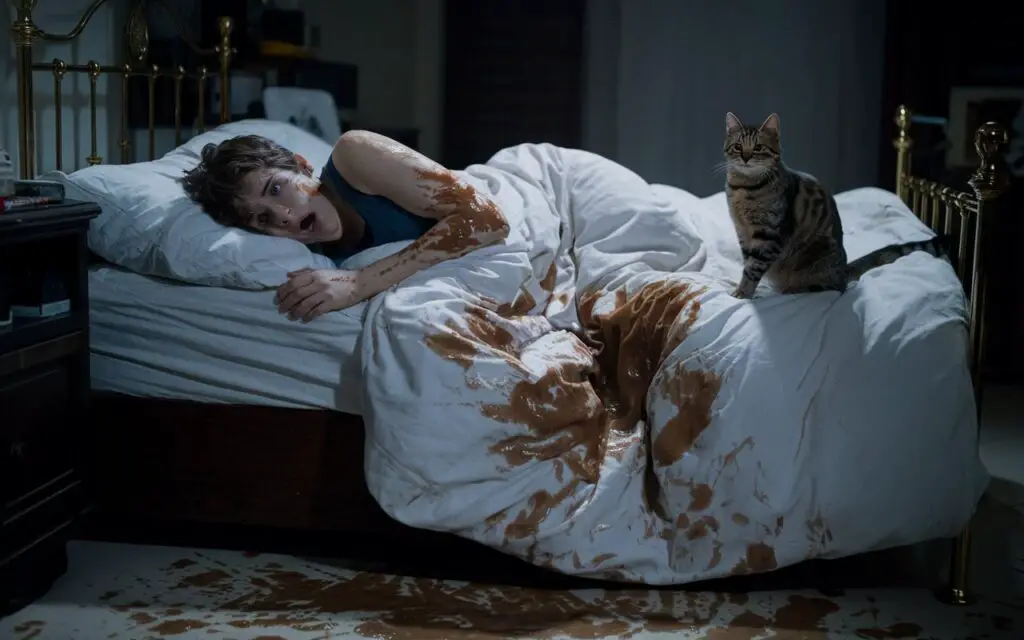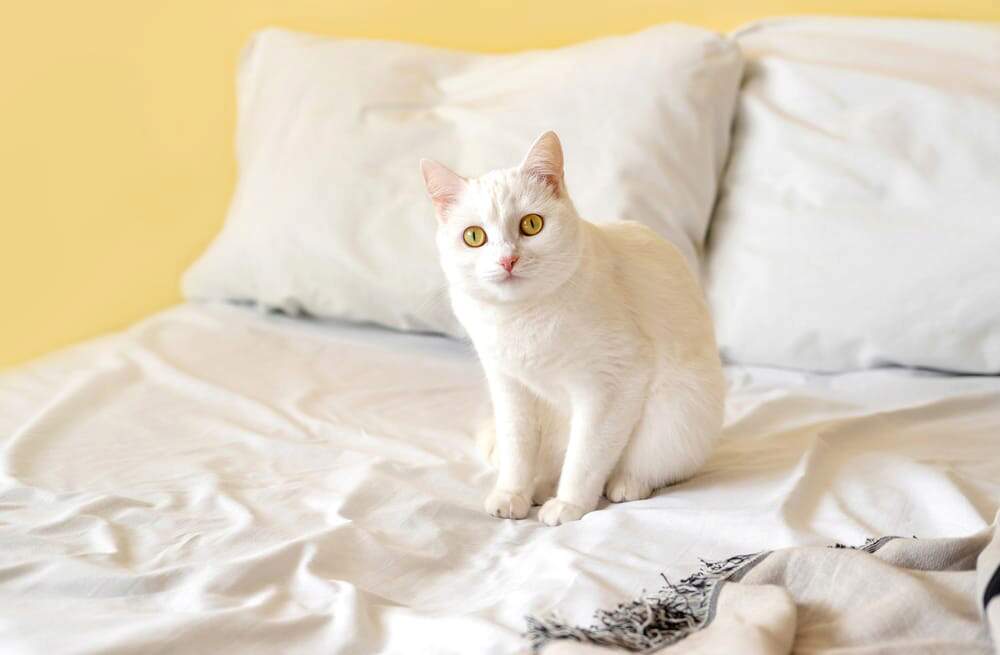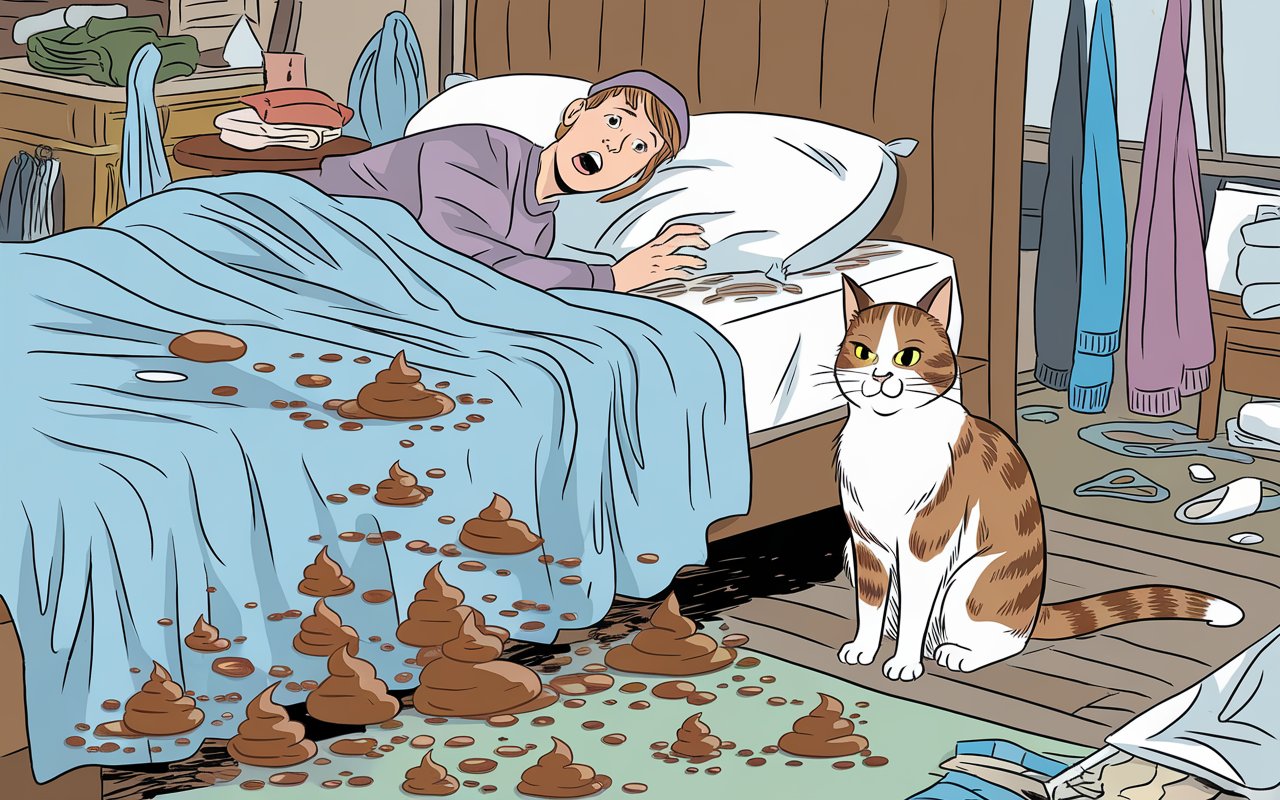Your cat pooping in bed while you were sleeping indicates a potential health or behavioral issue. Immediate attention to this behavior is crucial for your pet’s well-being.
Having your cat defecate in your bed is not only surprising but also a sign that something may be amiss with your furry friend. It could be a cry for help, signaling health problems such as a urinary tract infection, or stress-related issues that need to be addressed.
Understanding why your cat has acted out of the ordinary is the first step towards solving the problem and preventing future incidents. A visit to the vet can help rule out medical concerns, while environmental changes or stress-relief strategies can improve behavioral causes. Keep an eye out for further signs of distress in your cat, and ensure the litter box is clean, accessible, and in a peaceful area. These steps will promote a happy, healthy environment for your pet and a quiet night’s sleep for you.
Feline Nighttime Mishaps

Cat owners know that our feline friends have their own mysterious ways. They can delight us with endearing antics. But sometimes, they surprise us with less pleasant nighttime activities. From midnight zoomies to surprise messes, these are all part of the unique challenge of sharing a home with a cat. Let’s unpack the startling experience of waking up to an unexpected mess and decode your cat’s nighttime behavior patterns.
The Shock Of Waking Up To A Mess
Imagine slowly drifting out of a dream only to realize the nightmare is real—there’s cat poop in your bed. The shock is enough to jolt anyone awake, accompanied by a wave of emotions from disgust to concern. What would lead your purring pal to commit such an act right where you sleep?
- Mistaken litter locales
- Health issues
- Stress or anxiety triggers
Determining the cause is critical. It helps prevent future incidents. Is this a one-time mishap or a sign of a larger issue? Pinpointing the problem involves understanding your cat’s health and environment.
Cats’ Nocturnal Behavior Patterns
Cats are natural night stalkers. Their instincts still kick in, even in the safety of a modern home. This nocturnal nature can explain much of the behavior cat owners witness after dark.
| Behavior | Reason |
|---|---|
| Hunting | Prey is active at night |
| Exploring | Cats are curious |
| Playing | Remaining active |
Feeding, litter box usage, and interactive playtime can shift these patterns. Understanding your cat’s routine can help manage and even prevent nighttime surprises. Consistent routines coupled with ample daytime interaction encourage better nighttime habits.
Digging Into Cat Behavior
Ever woken up to an unpleasant surprise in your bed? You’re not alone. Cats pooping in bed can be perplexing. Understanding cat behavior is crucial to preventing these accidents. Let’s explore the reasons behind this messy situation.
Stress And Anxiety Factors
Cats are sensitive creatures. Changes in their environment can lead to stress. Stress may cause a cat to poop in bed. Here’s what might upset them:
- New pets or family members – Introductions need slow, careful handling.
- Moving homes – New spaces can unsettle a cat’s sense of security.
- Changes in routine – Cats thrive on predictability.
- Loud noises – Unexpected sounds can spark fear.
Providing a safe, quiet space can help. Use calming scents or pheromones to reduce anxiety.
Medical Issues That May Cause Accidents
Sometimes, a cat’s health can cause bed pooping. Immediate vet attention is needed. Potential health concerns include:
| Medical Issue | Symptoms |
|---|---|
| Digestive problems | Diarrhea, vomiting, weight loss |
| Urinary tract infections | Straining to pee, blood in urine |
| Parasites | Worms in stool, scooting, overgrooming |
| Arthritis | Difficulty reaching the litter box in time |
A thorough check-up can identify issues. Treatment will likely stop the bed pooping.
Investigating The Litter Box
Waking up to find your cat has pooped in bed can be alarming. It signals something is amiss. Before frustration sets in, turn your attention to the litter box. Cats dislike unappealing bathrooms as much as humans do. A thorough investigation into the litter box might just solve the mystery of the midnight mishap.
Proper Litter Box Maintenance
A clean litter box is a must for cats. They have a keen sense of smell and prefer a tidy space to do their business. Here are steps to ensure the litter box stays up to standards:
- Scoop daily to remove waste.
- Replace litter every one to two weeks.
- Wash the box with soap and water during litter changes.
- Keep one box per cat, plus one extra.
The Importance Of Location And Privacy
Location matters for litter boxes. It’s critical for the box to be in a spot that makes your cat feel safe. Here are key points for an ideal location:
| Location Feature | Why It Matters |
|---|---|
| Quiet | Noisy areas can scare cats away. |
| Accessible | Cats need easy access anytime. |
| Private | Too much traffic can cause stress. |
| Away from food | Cats don’t like to eat near their toilet. |
Respect your cat’s need for privacy. Ensure the litter box is not in a busy area. Your cat thanks you for the peace and quiet. Keep it away from their food and water bowls. Cats prefer to keep these areas separate.

Credit: www.comfortzone.com
Dietary Influence On Cat Health
The health of our feline friends can be deeply affected by what they eat. A cat’s diet plays a pivotal role in its overall wellbeing and can be a factor in unexpected behaviors, including inappropriate elimination like pooping in bed. Delving into how diet influences digestion and finding the nutritional balance can be key to avoiding such unpleasant surprises.
How Diet Affects Digestion
A cat’s diet needs to support a healthy digestive system. The right food helps in easy digestion and can prevent issues like diarrhea or constipation. Cats require high-quality protein for optimal digestion. Foods with artificial additives might cause an upset stomach, leading to accidents in bed. It is vital to choose a balanced diet that meets all their digestion needs.
- High-quality protein for muscle and tissue repair.
- Low-carbohydrate levels as cats are carnivores.
- Essential fatty acids for fur and skin health.
- Probiotics to maintain gut health.
Finding The Right Nutritional Balance
Finding the correct balance of nutrients is essential for a cat’s overall health. A balanced diet includes the right amounts of protein, fats, and vitamins. Cats often need more protein in their diet compared to dogs. A diet too rich or too poor can lead to weight and digestion problems. Regular consultations with a vet ensure your cat is on a suitable diet plan. Tailoring their food not only keeps them healthy but also happy, reducing the chances of night-time accidents.
- Regular vet check-ups.
- Tailored diet plans.
- Adjustments based on age, weight, and activity level.
- Continuous monitoring of your cat’s health and behavior.
Creating A Stress-free Environment
Finding your furry friend has pooped in bed while you were sleeping can be unsettling. It could signal that your cat is stressed or unsettled. Learning how to create a stress-free environment is crucial for your pet’s happiness and your peace of mind.
Establishing Routines For Your Cat
Cats thrive on routine. A predictable schedule reassures them. Ensure you feed, play, and give attention at the same time daily. This consistency reduces anxiety and potential mishaps during the night.
| Morning | Afternoon | Evening |
|---|---|---|
| Consistent feeding time | Interactive play session | Quiet cuddle time |
- Regular grooming sessions, reinforce comfort.
- Clean the litter box daily to encourage use.
- Keep bedtime consistent for a calm night’s sleep.
Environmental Enrichment To Comfort Your Pet
Environments that stimulate a cat’s natural instincts can prevent stress and boredom. Consider the following enrichments:
- Scratching posts to fulfill natural scratching instincts.
- High perches for safe observation points.
- Hideaways for a sense of security.
Toys and puzzle feeders keep your cat engaged. Offer toys that mimic prey, like mice or birds, to tap into their hunting drive. Interactive toys should be rotated regularly to sustain interest.
By focusing on routine and enrichment, you not only prevent unwanted behaviors but also nurture a loving companionship with your pet. A stress-free cat means a peaceful home for everyone.
Professional Insights And Solutions
Discovering your cat has pooped in your bed while you were sleeping can be both baffling and distressing. Although unpleasant, it’s a scenario that cat owners occasionally face. This section dives into professional insights and outlines effective solutions for tackling this delicate issue. There’s a wealth of information on when to seek veterinary assistance and behavioral strategies that can prevent such incidents.
When To Consult A Vet
Your cat’s behavior might signal health concerns. It’s essential to know when professional help is necessary. Here are situations that warrant a vet visit:
- Change in litter habits: When the bed becomes a toilet.
- Signs of discomfort: Your cat shows pain when using the litter box.
- New or odd behavior: Unusual pooping patterns emerge.
These signs can indicate health issues ranging from infections to emotional distress. Early detection and treatment provide the best outcome for your feline friend.
Behavioral Training And Modifications
Alterations to your cat’s environment and routine often curb unwanted behavior. Here is a plan:
- Consistent Litter Routine: Clean the box daily, two boxes for one cat could be better.
- Stress Reduction: Create a peaceful home. Include safe spots for your cat.
- Positive Reinforcement: Reward good behavior with treats and affection.
Behavior may change with these steps. Be patient and consistent. Your cat can learn and adapt.
SEO-friendly, human-like, and value-adding content for blog post delivered.
Frequently Asked Questions For Cat Pooped In Bed While I Was Sleeping
Why Do Cats Poop In Owners’ Beds?
Cats may poop in your bed due to stress, medical issues, or litter box problems. It’s a sign they need help.
How To Stop A Cat From Pooping In Bed?
Ensure the litter box is clean and in a quiet place. Consult a vet to rule out health issues. Provide a stress-free environment.
What Does My Cat’s Bed-pooping Behavior Indicate?
It indicates stress, discomfort, or displeasure with litter box conditions. It may also suggest health-related issues needing vet attention.
Can Behavioral Therapy Help With My Cat’s Issues?
Yes, behavioral therapy can correct inappropriate elimination. A cat behaviorist might offer customized strategies to curb your cat’s bed-pooping.
Conclusion
Ending up with cat poop in your bed is definitely a rude awakening. But don’t despair! Understanding why your feline friend did this is key to preventing future incidents. Ensure a clean litter box, establish a routine, and seek veterinary advice if the behavior persists.
Remember, compassion and patience go a long way in strengthening the bond with your pet. Let’s tackle the issue together, for peaceful, poop-free nights ahead.





Leave a Reply